A Conversation with Bruce Duffie
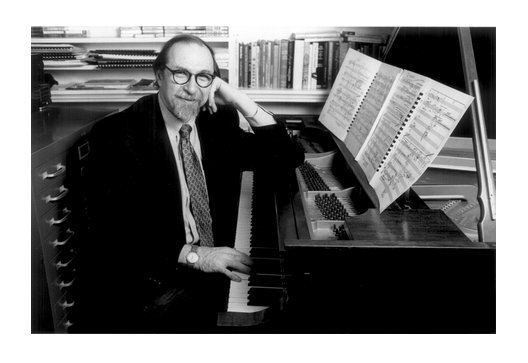

Elliott Schwartz (January 19, 1936, in New York City - December 7, 2016 in Maine) studied composition with Otto Luening and Jack Beeson at Columbia University (AB 1957, MA '58, Ed.D '62). He also worked privately with Paul Creston. He was the Robert K. Beckwith Professor of Music at Bowdoin College, where he taught since 1964, including twelve years as department chair; from 1988 to 1992 he also held a half-time Professorship of Composition at The Ohio State University School of Music. 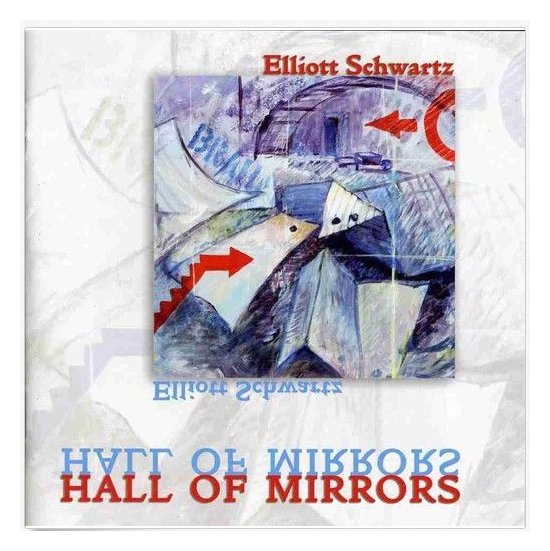 Visiting appointments included Trinity College of Music, London (1967),
the University of California/Santa Barbara (College of Creative Studies,
1970, '73, '74), the University of California/San Diego (Center for Music
Experiment, 1978-79), and Distinguished University Visiting Professorship
at The Ohio State University (1985-86). He spent the fall 1993 and spring
1999 terms at Cambridge University (UK) as holder of a visiting Fellowship
at Robinson College.
Visiting appointments included Trinity College of Music, London (1967),
the University of California/Santa Barbara (College of Creative Studies,
1970, '73, '74), the University of California/San Diego (Center for Music
Experiment, 1978-79), and Distinguished University Visiting Professorship
at The Ohio State University (1985-86). He spent the fall 1993 and spring
1999 terms at Cambridge University (UK) as holder of a visiting Fellowship
at Robinson College.He has served as President of the College Music Society, National Chair of the American Society of University Composers (now renamed the Society of Composers, Inc.), Vice-President of the American Music Center, President of the Maine Composers Forum, and music panelist for the Maine Arts Council. He was also a board member of the American Composers Alliance. He kept up with the latest trends. In addition to his works for standard instruments, according to the obituary in the Portland Press Herald, “He composed one piece based on actual Facebook posts, which included musicians reading the posts, while another piece featured TVs and radios on stage with the performers. His 1966 piece “Elevator Music” was performed by 12 small groups on various floors of a building, while the audience rode an elevator and heard parts of the piece on each floor.” Elliott Schwartz is co-editor of the anthology Contemporary Composers on Contemporary Music, co-author of Music Since 1945, and the author of Electronic Music: A Listener's Guide; The Symphonies of Ralph Vaughan Williams and Music: Ways of Listening. He has also written essays and reviews for Perspectives of New Music, The Musical Quarterly, Musical America, Music and Musicians (England), Nordic Sounds (Denmark) and other publications. His compositions are published by G.Schirmer-AMP, MMB-Norruth, Theodore Presser, Carl Fischer and ACA. A number of his works are on Folkways, Advance, Orion, Arista and Opus One long-play records. There are also compact disc recordings of his music on the New World, CRI, Innova, Vienna Modern Masters, O.O. Discs, Capstone, North-South Consonance (Albany), Metier and GM labels. Schwartz was a member of BMI. His wife, Dorothy Schwartz, was an artist, professor and past director of the Maine Humanities Council who was considered a driving force in Maine’s cultural scene for some 20 years. She died in 2014 at the age of 75. -- Links here and below refer
to my Interviews elsewhere on my website. BD
|
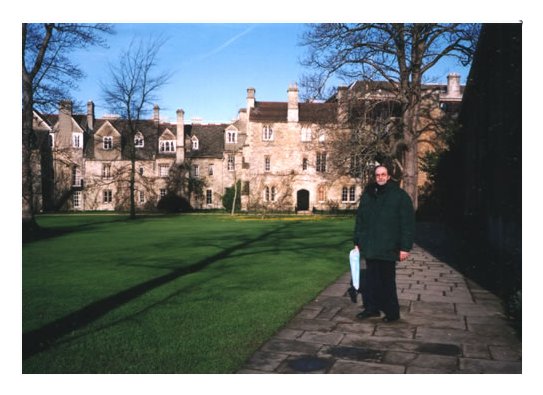 BD: Is that more satisfying to get involved in
all kinds of things in music?
BD: Is that more satisfying to get involved in
all kinds of things in music?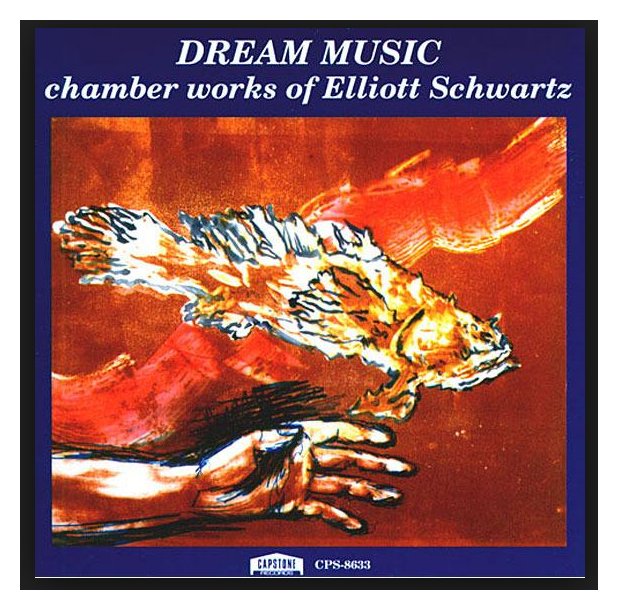 BD:
When you’re writing a piece of music, do you take into consideration the public
that will be listening to it?
BD:
When you’re writing a piece of music, do you take into consideration the public
that will be listening to it?
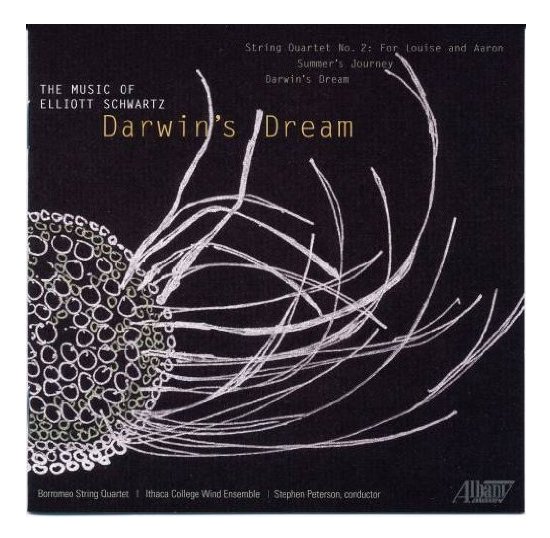 ES: Oh! [Laughs, then thinks again]
It pleases a hypothetical audience which, of course, starts with myself, and
then all of the others that I imagine who I think are out there. Occasionally
I surprise myself when I discover there really are some people out there!
I would like to give us all some pleasure, and to provide playable music
for performer-friends of mine. I think of them as another kind of audience,
a very special audience. These are people who enjoy performing new
music, and who in fact act as a second wave of, let’s say, missionaries
going out to proselytize for the cause of new music, twentieth-century music.
In certain ways I’ve been more of a popularizer rather than innovator.
I would never think of myself as somebody known for daring, cutting edge,
once-in-a-lifetime ideas. [Like a side-show barker] “Be
the first on your book to have this brand new idea!”
In fact, I am just the opposite. Over the years I’ve spent most of
my professional life either as a teacher or as a composer in trying to digest
and synthesize a number of trends and issues and developments, to try and
make them fairly accessible to a broad audience of interested and intelligent
laymen. I do this as a teacher at Bowdoin College, and I do this for
an audience of a music appreciation via my textbooks. I do this every
time I write program notes, or whenever I speak to a group of symphony subscribers.
I obviously do this in my own music, and I hope that the music itself acts
as a way of pulling together strands of different sorts that have all been
various ways of my tying together aspects of what’s happened in the twentieth
century. I am making them fairly accessible I imagine, or at least
I hope, to some segment of that audience out there — again,
not necessarily an audience of other composers, but an audience of laymen.
ES: Oh! [Laughs, then thinks again]
It pleases a hypothetical audience which, of course, starts with myself, and
then all of the others that I imagine who I think are out there. Occasionally
I surprise myself when I discover there really are some people out there!
I would like to give us all some pleasure, and to provide playable music
for performer-friends of mine. I think of them as another kind of audience,
a very special audience. These are people who enjoy performing new
music, and who in fact act as a second wave of, let’s say, missionaries
going out to proselytize for the cause of new music, twentieth-century music.
In certain ways I’ve been more of a popularizer rather than innovator.
I would never think of myself as somebody known for daring, cutting edge,
once-in-a-lifetime ideas. [Like a side-show barker] “Be
the first on your book to have this brand new idea!”
In fact, I am just the opposite. Over the years I’ve spent most of
my professional life either as a teacher or as a composer in trying to digest
and synthesize a number of trends and issues and developments, to try and
make them fairly accessible to a broad audience of interested and intelligent
laymen. I do this as a teacher at Bowdoin College, and I do this for
an audience of a music appreciation via my textbooks. I do this every
time I write program notes, or whenever I speak to a group of symphony subscribers.
I obviously do this in my own music, and I hope that the music itself acts
as a way of pulling together strands of different sorts that have all been
various ways of my tying together aspects of what’s happened in the twentieth
century. I am making them fairly accessible I imagine, or at least
I hope, to some segment of that audience out there — again,
not necessarily an audience of other composers, but an audience of laymen.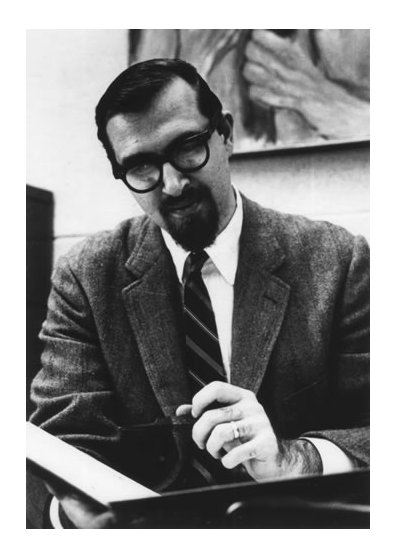 ES: Some of them have deadlines — that
is actual dates which must be honored — otherwise there
is no commission. That is the piece isn’t going to be played if it’s
not played on the date that it’s due. What happens in my case is that
I usually know, certainly a year or two head, what is due for the future and
which ones I have to attack. The question is which things you’re going
to accept. The timetable is that you’re going to do the piece first
which is due first, but I suppose your question might be if a new offer comes
up.
ES: Some of them have deadlines — that
is actual dates which must be honored — otherwise there
is no commission. That is the piece isn’t going to be played if it’s
not played on the date that it’s due. What happens in my case is that
I usually know, certainly a year or two head, what is due for the future and
which ones I have to attack. The question is which things you’re going
to accept. The timetable is that you’re going to do the piece first
which is due first, but I suppose your question might be if a new offer comes
up.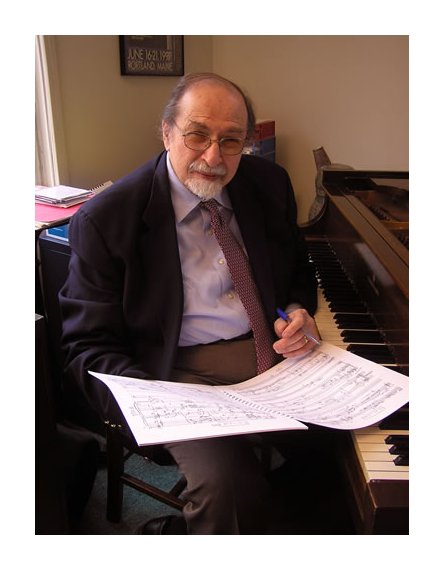 BD:
Would it spoil it to be perfect?
BD:
Would it spoil it to be perfect?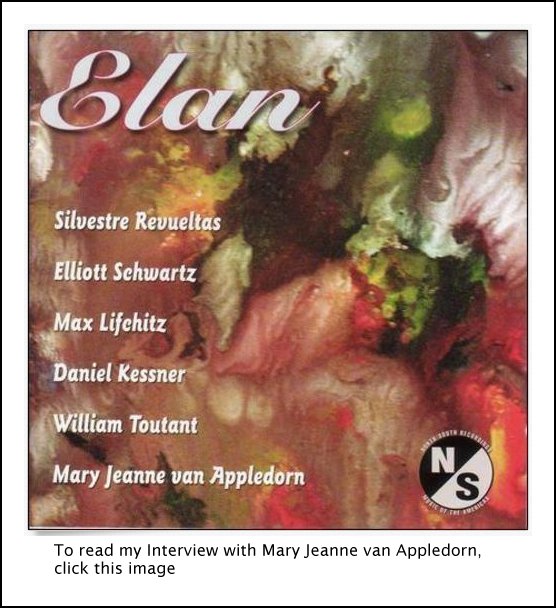 ES:
Yes. In a sense they’re both upsides. I’m not claiming that either
is an up or a down, but in one sense, some of my music tends to be a response
to what I perceive as the negative effects of the last big revolution, because
I really try to stress live performance versus canned performance. In
another sense you could say that a very different aspect of my music is a
positive response to the fact that audiences today have heard a wider variety
of music than probably any generation in history. You could go to any
record shop and have in the bins all kinds of ethnic musics and folk musics,
and non-Western musics and Early Renaissance musics, Avant-Garde musics, as
well as the complete symphonic literature. You just go on and on and
on and on!
ES:
Yes. In a sense they’re both upsides. I’m not claiming that either
is an up or a down, but in one sense, some of my music tends to be a response
to what I perceive as the negative effects of the last big revolution, because
I really try to stress live performance versus canned performance. In
another sense you could say that a very different aspect of my music is a
positive response to the fact that audiences today have heard a wider variety
of music than probably any generation in history. You could go to any
record shop and have in the bins all kinds of ethnic musics and folk musics,
and non-Western musics and Early Renaissance musics, Avant-Garde musics, as
well as the complete symphonic literature. You just go on and on and
on and on!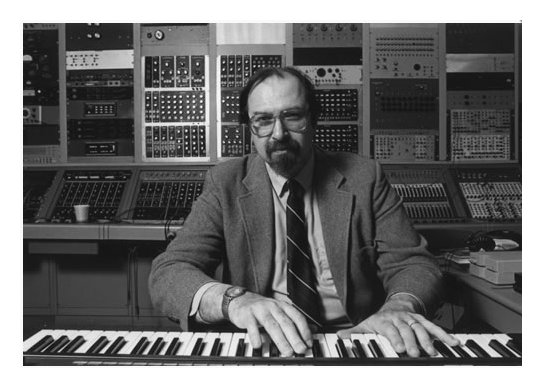 ES:
Very little.
ES:
Very little.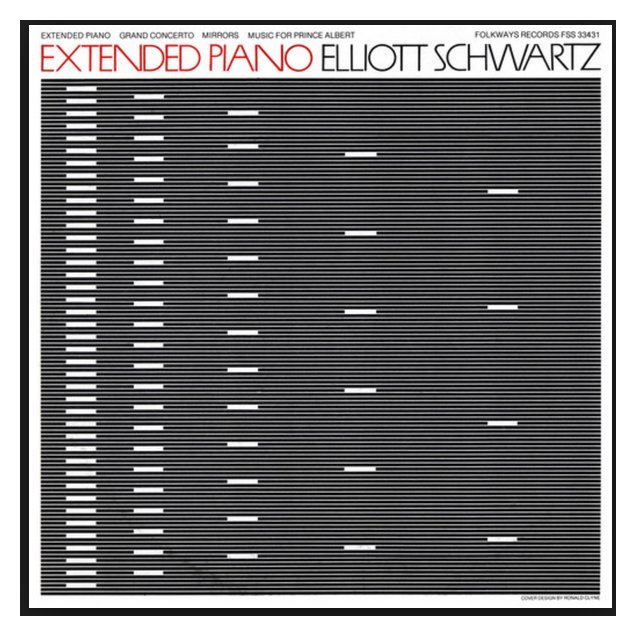 BD:
Are you then a creator, or are you merely a controller?
BD:
Are you then a creator, or are you merely a controller?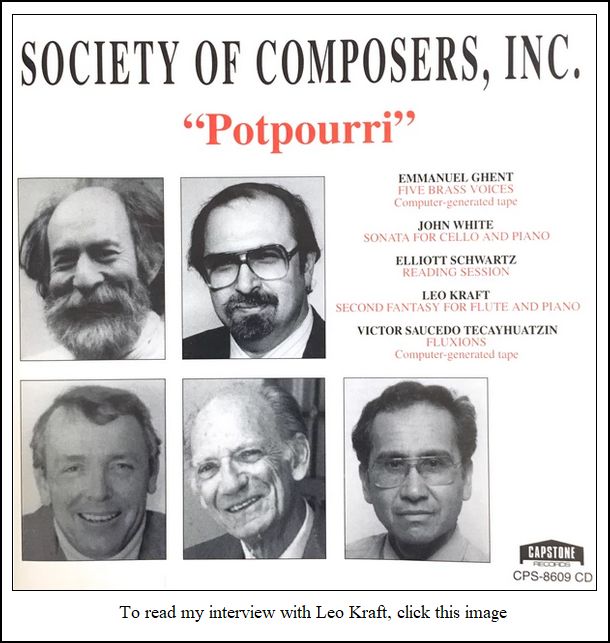 ES: It will be called The Society of Composers
Inc., I guess.
ES: It will be called The Society of Composers
Inc., I guess.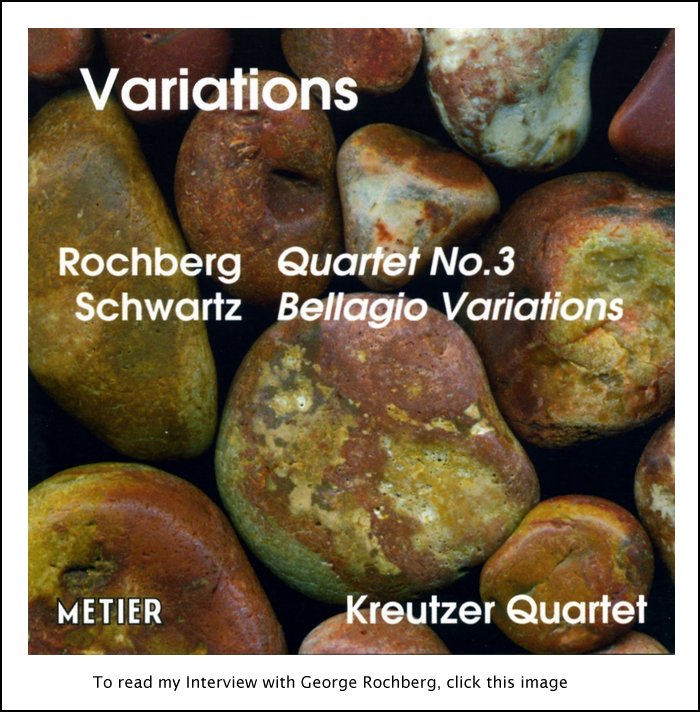 BD:
Now what is this special conference you’re here for this week?
BD:
Now what is this special conference you’re here for this week?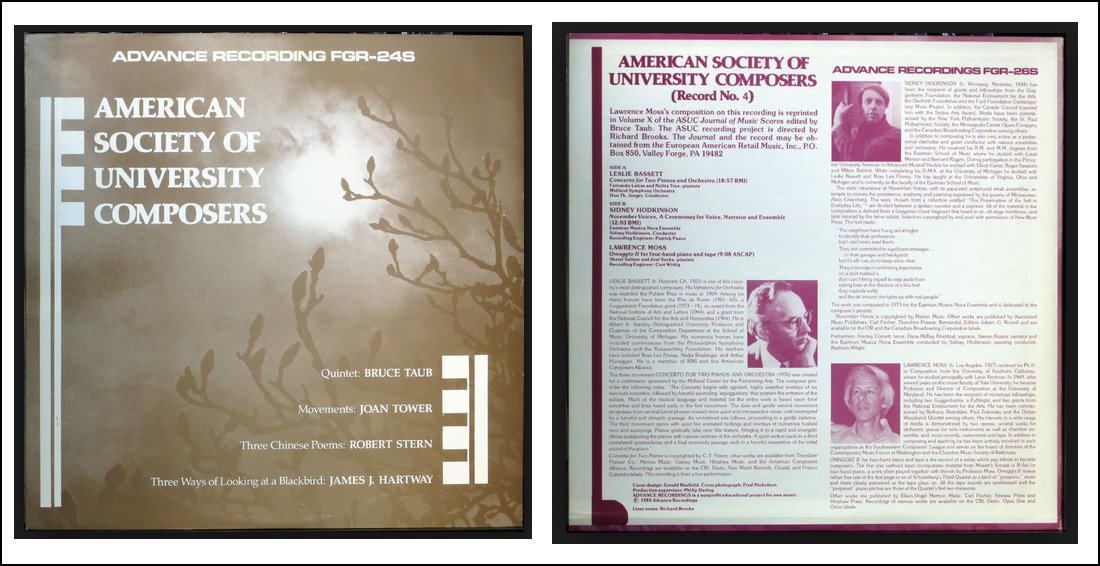
© 1987 Bruce Duffie
This conversation was recorded in Chicago on April 5, 1987. Portions were broadcast on WNIB the following week, and again in 1991 and 1996. This transcription was made in 2017, and posted on this website at that time. My thanks to British soprano Una Barry for her help in preparing this website presentation.
To see a full list (with links) of interviews which have been transcribed and posted on this website, click here.
Award - winning broadcaster Bruce Duffie was with WNIB, Classical 97 in Chicago from 1975 until its final moment as a classical station in February of 2001. His interviews have also appeared in various magazines and journals since 1980, and he now continues his broadcast series on WNUR-FM, as well as on Contemporary Classical Internet Radio.
You are invited to visit his website for more information about his work, including selected transcripts of other interviews, plus a full list of his guests. He would also like to call your attention to the photos and information about his grandfather, who was a pioneer in the automotive field more than a century ago. You may also send him E-Mail with comments, questions and suggestions.